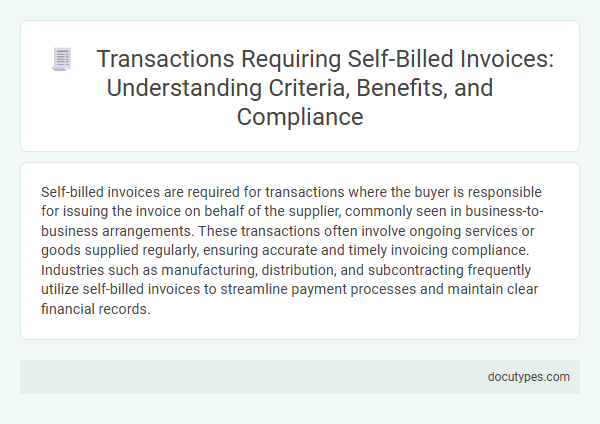Self-billed invoices are required for transactions where the buyer is responsible for issuing the invoice on behalf of the supplier, commonly seen in business-to-business arrangements. These transactions often involve ongoing services or goods supplied regularly, ensuring accurate and timely invoicing compliance. Industries such as manufacturing, distribution, and subcontracting frequently utilize self-billed invoices to streamline payment processes and maintain clear financial records.
Introduction to Self-Billed Invoices in Transactions
Self-billed invoices are documents issued by the buyer rather than the supplier to record a transaction. These invoices streamline billing processes and improve accuracy in certain types of commercial transactions.
- Business-to-Business (B2B) Transactions - Self-billed invoices are commonly used when businesses have ongoing relationships requiring consistent invoicing.
- Consignment Sales - Buyers generate self-billed invoices to document goods sold on behalf of suppliers under consignment agreements.
- Subcontracting and Service Agreements - When buyers control billing, self-billed invoices help accurately reflect services provided under subcontracted work.
Key Criteria for Issuing Self-Billed Invoices
Self-billed invoices are typically required for transactions where the buyer is responsible for issuing the invoice instead of the supplier. Key criteria include an agreement between both parties, ensuring that your company controls the invoicing process.
Such invoices are common in industries with frequent or recurring transactions, like manufacturing or logistics. The buyer must also ensure accuracy in details like amounts, dates, and tax information to maintain compliance.
Common Scenarios Requiring Self-Billed Invoices
Self-billed invoices are essential for specific business transactions where the buyer prepares the invoice instead of the supplier. These invoices help ensure accuracy and compliance in various sectors.
- Consignment Stock Transactions - Businesses often use self-billing when goods are held on consignment to simplify invoicing and stock management.
- Construction and Contracting Services - Self-billed invoices are common when subcontractors provide services, allowing the main contractor to issue accurate invoices.
- Regular Supply Agreements - Customers who frequently purchase from suppliers may issue self-billed invoices to streamline payment and record-keeping processes.
You should consider self-billed invoices to improve control and consistency in transaction documentation.
Regulatory Compliance for Self-Billed Invoices
Self-billed invoices are mandatory for transactions where the buyer issues the invoice to the supplier, commonly used in sectors like construction and manufacturing. Regulatory compliance requires clear mutual agreement between parties before issuing self-billed invoices to ensure accuracy and legality. Tax authorities mandate proper documentation and timely submission to prevent fraud and maintain transparent financial records.
Benefits of Using Self-Billed Invoices
Self-billed invoices are required in transactions where the buyer is responsible for issuing the invoice instead of the supplier. Common scenarios include subcontracting, supply chain partnerships, and certain service agreements. Using self-billed invoices ensures accuracy, reduces administrative burden, and streamlines tax compliance for both parties involved.
Documentation and Record-Keeping for Self-Billed Invoices
Self-billed invoices are required for transactions where the buyer generates the invoice on behalf of the seller. This practice is common in industries with ongoing supplier relationships and approved agreements.
Documentation for self-billed invoices must be thorough to ensure compliance with tax regulations. Your records should include copies of self-billed invoices, approval agreements between parties, and proof of delivery or service completion. Maintaining accurate records supports audit processes and helps verify the legitimacy of the transactions.
Risks and Challenges in Self-Billing Arrangements
| Types of Transactions Requiring a Self-Billed Invoice | Transactions involving subcontractors, freelancers, and suppliers often require self-billed invoices. Common scenarios include construction projects, outsourcing services, and supply chain operations where the buyer generates the invoice on behalf of the supplier. |
|---|---|
| Risks in Self-Billing Arrangements | Self-billing poses risks such as invoice accuracy disputes, VAT compliance errors, and contractual misunderstandings. Incorrect self-billed invoices can lead to tax audits, penalties, or payment delays. The reliance on buyer-generated documentation may compromise supplier verification and record-keeping integrity. |
| Challenges in Implementing Self-Billing | Coordination between buyer and supplier is critical but challenging. Agreements must clearly define invoice issuance responsibilities and approval workflows. Managing system integration, data consistency, and timely adjustments further complicate the arrangement. Legal and jurisdictional variations in invoicing regulations demand careful attention. |
| Mitigation Strategies | Establishing formal self-billing agreements, regular compliance reviews, and automated invoice validation tools reduces risks. Transparent communication channels and comprehensive audit trails support dispute resolution and regulatory adherence, ensuring seamless transaction processing. |
Steps to Implement Self-Billed Invoicing Processes
What types of transactions require a self-billed invoice? Self-billed invoices are commonly used in business-to-business transactions where the buyer agrees to prepare the invoice on behalf of the supplier. These transactions often involve consistent, recurring services or goods where accuracy and efficiency in billing are essential.
What are the key steps to implement self-billed invoicing processes? Start by obtaining written agreement from both parties outlining responsibilities and compliance with tax regulations. Next, establish a clear procedure for invoice creation, approval, and record-keeping to ensure accuracy and audit readiness.
How should your business manage compliance when using self-billed invoices? Ensure the self-billed invoices contain mandatory information such as supplier details, description of goods or services, VAT amounts, and invoice dates. Regularly review processes to maintain adherence to local tax laws and reduce the risk of errors or disputes.
Best Practices for Ensuring Invoice Accuracy
Self-billed invoices are commonly required for transactions where the buyer is responsible for issuing the invoice on behalf of the supplier. This practice is prevalent in industries such as construction, logistics, and manufacturing, where precise control over billing is necessary.
Ensuring invoice accuracy involves verifying transaction details like quantities, prices, and tax rates before issuance. Maintaining clear communication between buyer and supplier helps prevent discrepancies and supports compliance with tax regulations.
What Types of Transactions Require a Self-Billed Invoice? Infographic

